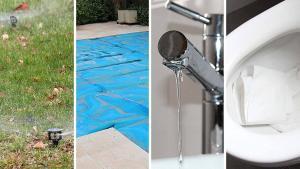When I am asked this question, I respond with my questions.
The first of which is, “What are you trying to achieve”? If the answer is, “ I want to leave more water in the rivers for the environment”, I respond with “If you live in an inland city like Canberra or a country town, all of the water you use inside your home or business for washing, cooking, cleaning and flushing, is treated and sent back to the rivers and streams after you use it”. Therefore, saving water in your home or business is likely to result in less water in our rivers and streams.”

The following tips will help if…
- there are low storage levels in our reservoirs and dams, and you are worried about you and your community running out of water,
- you are only on the tank or bore water,
- you want to save money,
- you want to have less impact on the environment by reducing the overall amount of energy used to make the water safe to use and retreat it once you have used it.
How to use water efficiently
I am not going to talk about buckets in showers, cleaning the shower when you are in it or when you should flush a toilet. As a plumber, I like to stick to the mechanical ways to save water.
- Make sure you have no dripping taps or leaking toilets. What most people consider to be a small leak could add up to thousands of litres per week.
- Use less toilet paper if you can. This usually results in less water required to flush a toilet.
- Check the pressure and temperature relief valve (TPRV) on your hot water system regularly. It should only drip during a heating cycle and the amount of water released should be a maximum of a few litres per day.
- Be vigilant about possible water leaks. Inspect your water meter to see if the numbers change when no water is in use. If you have tank or bore water your pump will cycle on and off if you have a water leak.
- Install a greywater system. Typical grey water systems allow you to use the reclaimed water on lawns and non-edible plants. More sophisticated systems allow you to use the water for flushing toilets and clothes washing.
- Do not install gas continuous flow hot water systems. Apart from the extra water used in long showers, they can also waste up to an additional 20,000 litres of water per year waiting for the water to heat up.
- Install a rainwater tank and connect as many downpipes as possible to it. Even a small tank can help save a lot of water if it is connected to toilets and washing machines.
- If you have a pool, buy a good pool cover and keep the pool covered when not in use during summer. This reduces evaporation considerably and also helps to keep the pool cleaner, thus requiring less backwashing.
- If you have a lawn irrigation system, have a smart controller installed. These controllers can measure moisture content in the soil and can cancel programmed watering times when rain is expected, or it has recently rained. Program your watering times for very early morning. This will allow the water to soak in and will result in less evaporation of water from the sprinkler spray.
- Have your evaporative cooler serviced regularly. Try to use your evaporative cooler at night and in the earliest parts of the day. Then close all windows and blinds to keep the heat out. This will save water and energy. Or replace your evaporative air conditioner it with a reverse cycle system.
- Use less hot water. Not only will you spend less time in the shower it result in less water being released from your TPRV on your hot water system.
- Consider a rainwater tank for your home in Canberra.
